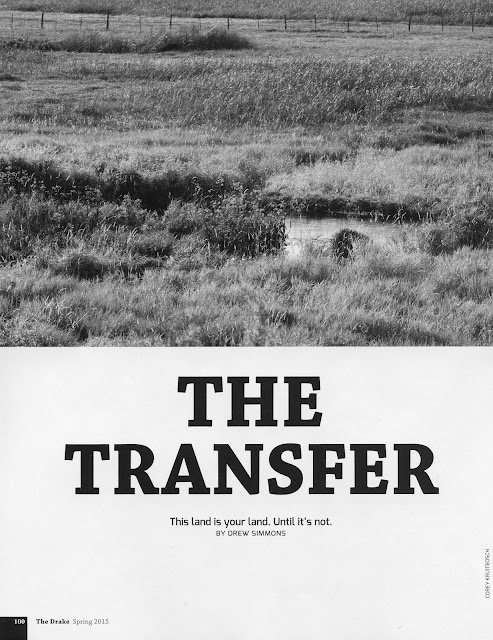Eat More Kelp
A few weeks ago, I made my first visit to the Natural Products Expo West show in Anaheim, Calif. Surrounded by virtually anything that anybody could ever buy in a Whole Foods-type store -- from organic dogfood to every conceivable chia-seed product you can imagine -- it was impossible not to share the eco-sensory overload on social media.
One of those posts prompted an old friend to reach out about his newest enterprise ... a kelp farming operation in Portland, Maine called Ocean Approved (www.oceanapproved.com)
Farming their kelp in Casco Bay and already cranking out 80,000 pounds of kelp a year, Ocean Approved sounds like a tasty triple-bottom line operation. I'm pretty sure I ate some on a salad at American Flatbread. It might have been on the pizza, too. Tasted great.
Tollef Olson is the founder of Ocean Approved, and spent some of his valuable time to visit with the wildly influential readership of WickedOutdoorsy.
In three words or less, what does kelp taste like?
Mild, slightly crunchy.
In five years when this is huge, where am I going to find kelp at my local grocery store? In the produce section next to the lettuce? Or in a refrigerator case next to the olives and salsa? Or somewhere else?
 In the freezer case with the other frozen seafood specialty items. Its a fresh frozen product. Use enough for one meal (a little goes a long way) and put the rest back in the freezer. A no waste veggie!
In the freezer case with the other frozen seafood specialty items. Its a fresh frozen product. Use enough for one meal (a little goes a long way) and put the rest back in the freezer. A no waste veggie!
How much does a pound (or whatever) of kelp cost to a shopper?
10 bucks a pound, give or take some coins.
Is there anyplace on earth where kelp is on the daily menu already?
Tons of places! Our kelp is in hospitals, private school cafeterias, college dining halls, and restaurants like Flatbread right here in Portland.
Who would be the best celebrity endorsement for kelp? Bono, Michelle Obama or Lindsay Vonn?
Michelle Obama on the nutrition side probably. She is rumored to already be on the kelp bandwagon. Bono on the sustainability side
What's the super-fast explanation of why kelp is important for the ocean environment?
It sequesters carbon and releases oxygen into the water. It fights ocean acidification. Our kelp farms form "structure" for all types of marine organisms. It also is a winter crop so it helps those people who rely on the ocean for jobs - winter is typically a very lean time for those who work the ocean.
 So there's the environmental angle of saving the oceans, the food angle of feeding a growing population, and the pure business angle of getting ahead of the curve on something truly new and innovative ... But which of those three is the biggest strength of this kelp endeavor?
So there's the environmental angle of saving the oceans, the food angle of feeding a growing population, and the pure business angle of getting ahead of the curve on something truly new and innovative ... But which of those three is the biggest strength of this kelp endeavor?
Three things. Good for us - nutrition. Good for planet - sustainable. Good for economy - new source of jobs for US labor. Biggest is probably that you are growing a crop that doesn't need fresh water, fertilizer, or tillable soil.
How big is the kelp "industry"?
Difficult to measure. On the global scale estimates are between $4-6 Billion per year.
Are there different "grades" of kelp, like levels of quality in maple syrup?
Not officially, but our kelp raised in the cold clean waters of Maine grows in one of the cleanest environments available and is then cleaned, blanched, and then flash frozen, as opposed to a dried kelp grown in a less ideal environment that is then "reconstituted" with preservatives and yellow and blue artificial color.
Who is currently buying Ocean Approved's harvest of 80,000 pounds of kelp a year?
 All different folks. I mentioned a bunch before- Flatbread, Phillips Exeter, Bowdoin, and many distributors - PFG, Native Maine, Farm Fresh in Rhode Island
All different folks. I mentioned a bunch before- Flatbread, Phillips Exeter, Bowdoin, and many distributors - PFG, Native Maine, Farm Fresh in Rhode Island
How much kelp is in your refrigerator right now?
My freezer is pretty full right now - 15 lbs? Some slaw and some rounds.
How does your wife feel about this whole kelp thing?
My wife thinks its a howl. We had a party where we attempted to construct the perfect sandwich using kelp. I think we came close. We named it the Ernie Banks - "so good you want to eat two!" The kids even eat it. I gotta get you some.



Comments
Post a Comment